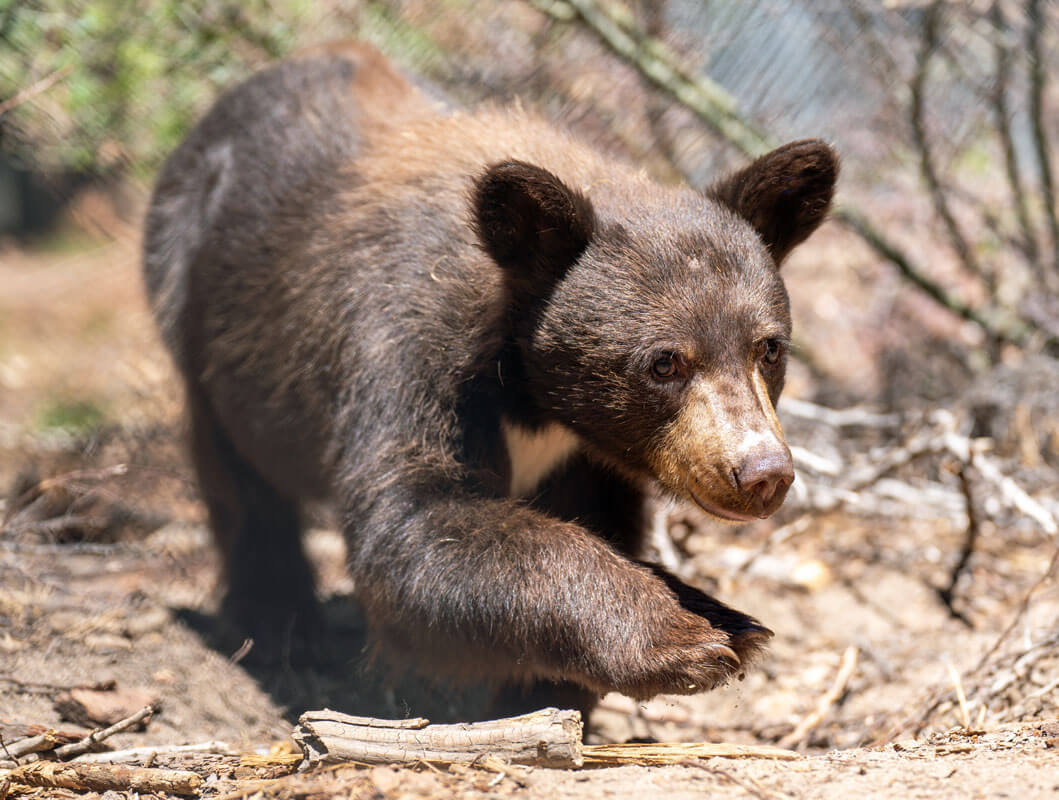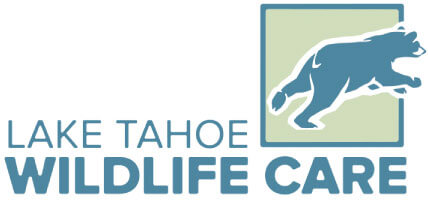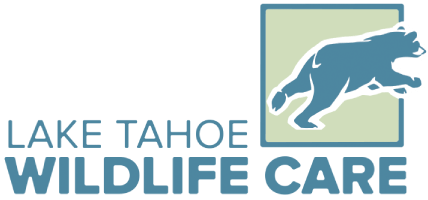
Bears waking up in the Spring
During springtime, local black bears begin coming out of torpor/hibernation. Some bears may even have avoided torpor/hibernation because they had access to food all winter.
Black bears in the Tahoe basin are a unique group and have grown accustomed to living with us in their forest home.
The males and two year olds are emerging from their dens first. Moms with yearling cubs and new babies will emerge a bit later as the weather warms.
After losing a third of their body weight, they are hungry and will immediately start looking for food, anywhere they can find it. Their natural first foods are grasses, roots and shoots. But sadly, bears living in the Tahoe basin have become accustomed to human food trash.
It is our duty in living with these beautiful bears to keep them wild and push them back to their natural food sources.
How to Keep Bears Safe
The two most important things you can do to keep our bears safe is to keep food and trash stored properly and to drive safely.
Bears with access to human food quickly become habituated to it, preferring to visit populated areas for food scraps rather than eat a natural diet. Habituated bears may be euthanized if they are considered a threat to humans. Securing your trash and food from bears is easy and helps keep our bears wild.
It is also very important to be bear aware when driving. In 2020, 15 bears were hit and killed in the city of South Lake Tahoe. Many other adults and cubs were hit and injured. LTWC received two cubs who were injured badly enough they could not return to their mothers, but needed surgery and rehabilitation our facility. As of April 2021, two adult bears have already been hit, right in the middle of town on Lake Tahoe Blvd.
Here is a list of how you can help keep bears (and humans) safe:
- Use bear resistant trash containers.
- Do not put any unsecured trash outside until the morning of your trash pick up day.
- If you store trash in a garage, keep it as far away from all doors as possible.
- Rinse containers of any smell that might attract bears before disposing them in the trash.
- Keep food scraps in a separate, sealed bag until trash day.
- Add a small amount of ammonia to each trash bag before sealing.
- Do not store trash or pet food near an outside door in your house.
- Do not feed or store pet food in the garage.
- Keep all food and scented toiletries cleaned up and out of your car. This includes chapstick, lotions, gum – anything with a scent.
- Keep car windows up and doors locked when not occupied. Although we sometimes hear myths that it is better to leave car doors unlocked so bears can see there is nothing in it, this is untrue. A bear can do thousands of dollars’ worth of damage to your vehicle; this also teaches it to open and investigate cars to look for food.
- Keep house doors and windows closed and locked at night.
- Keep your garage refrigerators and freezers clean of any spills or rotting smells.
- If a bear does enter your home always remember to leave the same exit route clear. They will try to exit the same way they came in.
- Drive safely, obey speed limits, and be on the lookout for bears and other wildlife in the road.
- When you see a bear crossing the street, remember that cubs could be following 20-50 feet behind!
- We know accidents can happen and some are unavoidable. If you accidentally hit a bear, PLEASE REPORT it immediately! No one will ever get in any trouble with the law or face any other ramifications for accidentally hitting wildlife. There are NO LAWS in the state of California to prosecute. It is our commitment at Lake Tahoe Wildlife Care to serve our Black Bears in case of injury or death. If a bear can be saved after an accident, the sooner we can intervene, the better.
What to do if you see a Black Bear:
- If a bear is walking down the street, in a neighbor’s yard, up a tree or just resting, leave them be! They are not interested in you and don’t want anything to do with you, your children or your pets. They are out looking for food and will move on when ready.
- If a bear is in your yard and you don’t mind, stay inside and keep pets inside until they leave.
- If a bear is in your yard and you would like them to leave, make them uncomfortable! Let them know you don’t want them there! Yell, bang pots and pans, use air horns, or anything that will make a loud noise to scare them off.
- If a bear has already obtained food, like trash or a large bag of dog food, they won’t leave until he is done eating. So it is important to make sure they cannot get into any trash or other food in the first place.
- NOTE: It is AGAINST THE LAW to lure and/or harass any wildlife or let pets harass wildlife in the state of California and punishable with fines and jail time. Please do not try to take a close up photo of a bear. Do not chase it or try to entice that bear into your photo range.
Some Black Bear Facts:
- Black Bears Are Not Grizzly or Brown Bears! Grizzly bears do not live anywhere near the Tahoe Basin.
- Black Bears do come in every color from blonde to coal black.
- Black Bears will not commonly attack humans, unless cornered or provoked, usually in an attempt to get away.
- Black Bears will not eat your pets.
- Black Bears are very smart and have great memories.
- Black Bears are food driven and will seek out food wherever it is available.
The Bluff Charge
Black Bears are normally shy, non-confrontational animals. When nervous or uneasy they will clack their teeth together, huff and puff, slap their feet on the ground and even take a couple of steps forward — the BLUFF CHARGE. Immediately following these forward steps, the bears will usually turn and retreat. They are just trying to tell us that they are uncomfortable and we are in their space. They are not getting ready to attack! It is, however, quite startling and scary to witness. If a bear is letting you know he is uncomfortable, take a couple steps back. Then continue to haze to get him to move along.
It is our responsibility to live in harmony with all of our wildlife neighbors in the Tahoe basin!

